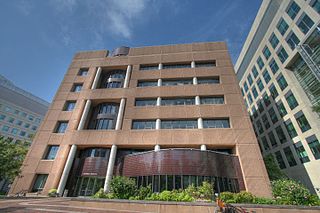
Whitehead Institute for Biomedical Research is a non-profit research institute located in Cambridge, Massachusetts, United States that is dedicated to improving human health through basic biomedical research. It was founded as a fiscally independent entity from the Massachusetts Institute of Technology (MIT), where its 17 members all hold faculty appointments in the MIT Department of Biology or the MIT Department of Bioengineering. Two members are National Medal of Science recipients; ten have been elected to the National Academy of Sciences; and four have been elected to the National Academy of Medicine; four are Howard Hughes Medical Institute Investigators.
The Indiana University School of Medicine has nine campuses throughout Indiana; the principal research and medical center is located on the Indiana University – Purdue University Indianapolis campus in Indianapolis. With 1,409 M.D. Program students and 158 Ph.D. students in 2017, IU is one of the largest allopathic medical schools in the United States. The school offers several joint-degree programs, including an MD/MBA, MD/MA, MD/MPH, and an MD-PhD Medical Scientist Training Program.
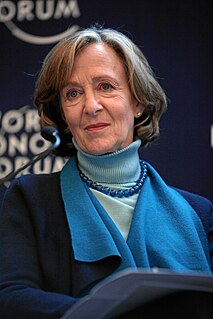
Susan Hockfield is an American neuroscientist who from December 2004 through June 2012 served as the sixteenth president of the Massachusetts Institute of Technology. Hockfield succeeded Charles M. Vest and was succeeded by L. Rafael Reif, who had served in her administration as Provost. Hockfield was the first biologist and the first woman to serve as the Institute's president. Hockfield, Professor of Neuroscience in MIT's Department of Brain and Cognitive Sciences and a member of the Koch Institute for Integrative Cancer Research, is a director of General Electric and of Qualcomm. She is an overseer of the Boston Symphony Orchestra, a trustee of the Carnegie Corporation of New York, and a member of the MIT Corporation. Before returning to MIT following her presidency, Hockfield held the Marie Curie Visiting Professorship at Harvard University's John F. Kennedy School of Government.
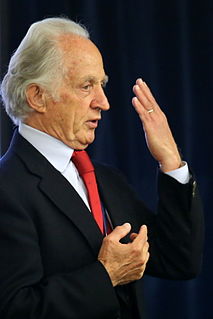
Mario Ramberg Capecchi is an Italian-born molecular geneticist and a co-winner of the 2007 Nobel Prize in Physiology or Medicine for discovering a method to create mice in which a specific gene is turned off, known as knockout mice. He shared the prize with Martin Evans and Oliver Smithies. He is currently Distinguished Professor of Human Genetics and Biology at the University of Utah School of Medicine.
James H. "Jim" Fallon is an American neuroscientist. He is professor of psychiatry and human behavior and emeritus professor of anatomy and neurobiology in the University of California, Irvine School of Medicine. His research interests include adult stem cells, chemical neuroanatomy and circuitry, higher brain functions, and brain imaging.
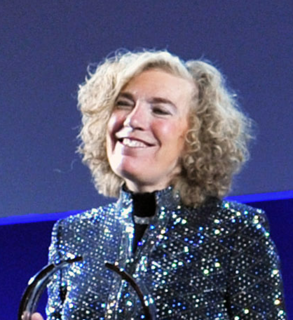
Elaine V. Fuchs is an American cell biologist, famous for her work on the biology and molecular mechanisms of mammalian skin and skin diseases, who helped lead the modernization of dermatology. Fuchs pioneered reverse genetics approaches, which assess protein function first and then assess its role in development and disease. In particular, Fuchs researches skin stem cells, and their production of hair and skin. She is an investigator at the Howard Hughes Medical Institute and the Rebecca C. Lancefield Professor of Mammalian Cell Biology and Development at The Rockefeller University.
Sanford Burnham Prebys Medical Discovery Institute (SBP) is a 501(c)(3) non-profit medical research institute focusing on basic and translational research, with major research programs in cancer, neurodegeneration, diabetes, and infectious, inflammatory, and childhood diseases. The Institute also specializes in stem cell research and drug discovery technologies.

Eva Lucille Feldman, M.D., Ph.D., F.A.A.N., F.A.N.A. is an American physician and the Russell N. DeJong Professor of Neurology at the University of Michigan. She is the Director of the NeuroNetwork for Emerging Therapies and Director of the University of Michigan ALS Center of Excellence, which includes the Pranger ALS Clinic. She is annually listed in Best Doctors in America, is a Past President of the Peripheral Nerve Society and the American Neurological Association, and a member of the National Academy of Medicine and Association of American Physicians.
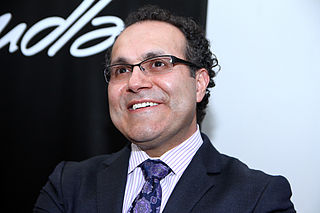
Alfredo Quiñones-Hinojosa is a neurosurgeon, author, and researcher. Currently, he is the William J. and Charles H. Mayo Professor and Chair of Neurologic Surgery and runs a basic science research lab at the Mayo Clinic Jacksonville in Florida. In recognition of his work, Dr. Quiñones-Hinojosa has received many awards and honors, including being named as one of the 100 most influential Hispanics in the U.S. by Hispanic Business Journal in 2008; as 2014 Neurosurgeon of the Year by Voices Against Brain Cancer, where he was also recognized with the Gary Lichtenstein Humanitarian Award; and by the 2015 Forbes magazine as one of Mexico's most brilliant minds in the world.
Ira Barrie Black was an American physician and neuroscientist who was an advocate of stem cell research and was the first director of the Stem Cell Institute of New Jersey at Robert Wood Johnson Medical School which was created to advance research in the field.

Sangeeta N. Bhatia, M.D., Ph.D. is an American biological engineer and the John J. and Dorothy Wilson Professor at MIT’s Institute for Medical Engineering and Science and Electrical Engineering and Computer Science (EECS) at the Massachusetts Institute of Technology (MIT) in Cambridge, Massachusetts, United States. Bhatia's research investigates applications of micro- and nano-technology for tissue repair and regeneration. She applies ideas from computer technology and engineering to the design of miniaturized biomedical tools for the study and treatment of diseases, in particular liver disease, hepatitis, malaria and cancer.

Gladstone Institutes is an independent, non-profit biomedical research organization whose focus is to better understand, prevent, treat and cure cardiovascular, viral and neurological conditions such as heart failure, HIV/AIDS and Alzheimer's disease. Its researchers study these diseases using techniques of basic and translational science. Another focus at Gladstone is building on the development of induced pluripotent stem cell technology by one of its investigators, 2012 Nobel Laureate Shinya Yamanaka, to improve drug discovery, personalized medicine and tissue regeneration.
Paul S. Knoepfler is an American biologist, writer, and blogger. He is a professor in the Department of Cell Biology and Human Anatomy, the Genome Center, and the Comprehensive Cancer Center at the University of California, Davis School of Medicine. In 2013, Knoepfler was named one of the 50 most influential people in the stem cell field.
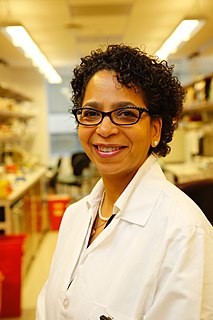
Jill Bargonetti is an American professor at the City University of New York with dual appointments at Hunter College and The Graduate Center. Her research is focused on tumor suppressor protein p53 and its role as an oncogene when it is mutated in breast cancer.

Lydia Villa-Komaroff is a molecular and cellular biologist who has been an academic laboratory scientist, a university administrator, and a business woman. She was the third Mexican American woman in the United States to receive a doctorate degree in the sciences (1975) and is a co-founding member of The Society for the Advancement of Chicanos/Hispanics and Native Americans in Science (SACNAS). Her most notable discovery was in 1978 during her post-doctoral research, when she was part of a team that discovered how bacterial cells could be used to generate insulin.
Paul R. Sanberg is an American scientist and inventor. His early work focused on the causes of brain cell death. His recent research has been on methods of repairing damaged brain tissue, and, in tandem with other scientists, demonstrating that stem cells derived from the blood of bone marrow and umbilical cords can be converted to neural cells.

Don W. Cleveland is an American cancer biologist and neurobiologist.

Katherine Koontz Sanford, also known as Katherine Sanford Mifflin, was an American biologist and cancer researcher who worked at the National Cancer Institute for nearly 50 years, serving as head of Laboratory of Cellular and Molecular Biology. In the 1940s she became the first person to successfully clone a mammalian cell in vitro, which allowed for more efficient means of creating pure strains of cells for study. She also developed the first laboratory test to distinguish people with Alzheimer's disease and people predisposed to cancer.
Li-Huei Tsai is a neuroscientist and the director of the Picower Institute for Learning and Memory in the Department of Brain and Cognitive Sciences at the Massachusetts Institute of Technology.
Michal Schwartz is a professor of neuroimmunology at the Weizmann Institute of Science and incumbent of The Maurice and Ilse Katz Professorial Chair in Neuroimmunology. She discovered new roles for immune cells in repair and neurogenesis, coining the term "protective autoimmunity" and expanding the field of immunology in neuroscience. She has been the elected chair of the International Society of Neuroimmunology (ISNI) since 2016, and her book “Neuroimmunity: A New Science that will Revolutionize How We Keep Our Brains Healthy and Young” received an honorable mention for the 2016 PROSE Awards, Biomedicine & Neuroscience category.












